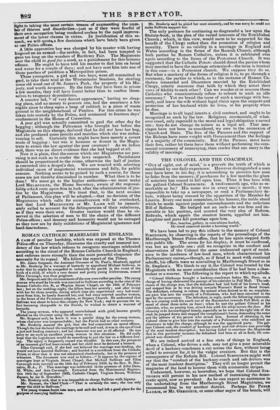ROMAN CATHOLIC MARRIAGES IN ENGLAND.
A CASE of peculiar hardship, which was exposed at the Thames -Police-office on Thursday, illustrates the cruelty and immoral ten- dency of the law which refuses to recognize marriages celebrated according to the ritual of the Roman Catholic Church in England; and enforces more strongly than the most powerful eloquence the necessity for its repeal. We follow the report of the Times.
Mr. James Sergeant, the Assistant Overseer of St. Paul's, Shadwell, applied to Mr. Broderip for a warrant of bastardy to apprehend Michael Sullivan, in order that he might be compelled to indemnify the parish in the event of the birth of a child, of which a very decent and pretty young Irishwoman, named Ellen Cavanagh, was then pregnant.
Mr. Sergeant said the circumstances of the case were rather peculiar. The young woman who stood by his side was married to Sullivan according to the rites of the Roman Catholic chuAli, at Virginia Street Chapel, on the 18th of February last ; but on the wedding-night, the fellow beat her severely ; and after living with her for three months' during which time she experienced very bad treat- ment from him, he basely deserted her, and had since married another woman, in the forms of the Protestant religion, at Stepney Church. He understood that Sullivan was about to leave this country for 1New York ; and to prevent the in- fant becoming chargeable to the Parish, he wished to obtain a warrant of bastardy.
The young woman, who appeared overwhelmed with grief, became greatly affected on the Overseer using the offensive term.
Mr. Sergeant said, he knew it was a painful thing for the young woman, whose character was irreproachable ; but the Parish had no other resource. Mr. Broderip assured the girl, that she had committed no moral offence. Though the law declared the marriage to be null and void, it was in the eye of God a just and binding contract ; and her character was not at all affected. He was sorry to see such an excellent young woman in this situation. He did really hope that the Legislature would do something to put the law on a different foot- ing. The injury it frequently caused was dreadful. In this case the prospects of an innocent girl had been ruined, and her child must be declared bastard. Ellen Cavanagh said, if she had not believed the marriage was binding, she would not have married Sullivan ; and handed in a certificate from the Catholic Priest, to show that it was not solemnized clandestinely, but in the presence of witnesses. The document was read as follows—" It appears by the register of marriages kept at Virginia Street Chapel, that Michael Sullivan and Ellen Cavanagh were married on the 18th day of February 1833, by the Rev. R. Hor- rabin, M.A., M.A., P. This marriage was celebrated in the presence of John Dane, M. White, and Ann Cavanagh. Extracted from the Matrimonial Register, this 19th day of September 1833, Catholic Chapel, Virginia Street, Wellclose Square, by me R. Horrabin."
Mr. Broderip said, that it was impossible to charge Sulliian with bigamy. Mr. Symons, the Chief Clerk—" That is certainly the case; she can only swear the child to Sullivan."
The young woman burst into tears, and said she had left a good place for the purpose of marrying Sullivan. Mr. Broderip said be pitied her most sincerely, and he was sorry he could not make Sullivan. support her.
The only pretence for continuing so disgraceful a law upon the Statute-book, is the plea of the vested interests of the Established Church ; which, in this view, would seem to be supported for the benefit of the Clergy rather than the promotion of religion and morality. There is no validity in a marriage in England and, Wales according to the forms of the Romish Church, although both parties be Roman Catholics, unless it is celebrated over again according to the forms of the Protestant Church. It was suggested that the Catholic Priests should direct the parties whom they married to have the marriage solemnized—the term is ironical in this case—in a Protestant church. We suppose they do so. But what a mockery of the forms of religion it is, to go through a ceremony, the parties to which, as in the instance of Roman Ca- tholics remarried and Dissenters married by the Established Clergy, utterly renounce that faith by which they attest their vows of fidelity to each other! Can we wonder at or censure those Catholics who conscientiously refuse to submit to such an idle ceremony? Yet we brand the issue of such a marriage with bas- tardy, and leave the wife without legal claim upon the support and protection of her husband while he lives, or his property when he dies.
Marriage is to all legal intents a civil contract, and ought to be recognized as such by the law. Religious ceremonials, of what- ever creed, only superadcl to the moral and legal obligation a sacred rite ; they do not change its nature as a legal act. That mar- riages have not been so considered, we owe to the connexion of Church and State. The fees of the Parsons and the support of the Bishops have more weight with Government than the feelings of a majority of the community. But if the Parsons must have their fees, rather let them have them without performing the cere- monial mummery of remarrying, than render that nee ssary to the validity of marriage.






















 Previous page
Previous page